#Robert of Huntingdon
Explore tagged Tumblr posts
Link
Chapters: 1/1
Fandom: Robin of Sherwood (TV 1984)
Rating: Teen and Up Audiences
Warning: Major Character Death
Relationships: Robert of Huntingdon & Marion of Leaford, Robert of Huntingdon & Will Scarlet, Robert of Huntingdon & Friar Tuck, Robert of Huntingdon & Merry Men, Robert of Huntingdon & Herne the Hunter
Characters: Robert of Huntingdon, Marion of Leaford, Will Scarlet, Friar Tuck, Little John, Much the Miller’s Son, Nasir (Robin of Sherwood), Herne the Hunter, Robin of Loxley (mentioned)
Additional Tags: Alternate Universe - Canon Divergence, 2x07/3x01 rewrite, Robert doesn’t reject the call, And accepts his destiny as Herne’s son, Introspection, Grief/Mourning, Developing Friendships, (though there’s still a way to go), Some of the Merries don’t really talk to him hence why they’re only in the character tags, No one actually dies in this fic but Robin’s death is mentioned so I’m just being cautious, Robert is also more aware of his privilege than in canon
Summary: Eighteen-year-old Robert of Huntingdon, despite his intial reservations, decides he'll remain and become Herne's son - but still worries about the reaction of the Merries, and whether he can truly take on the mantle.
2 notes
·
View notes
Text
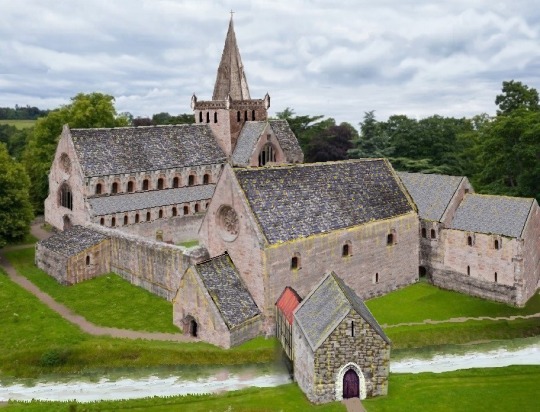
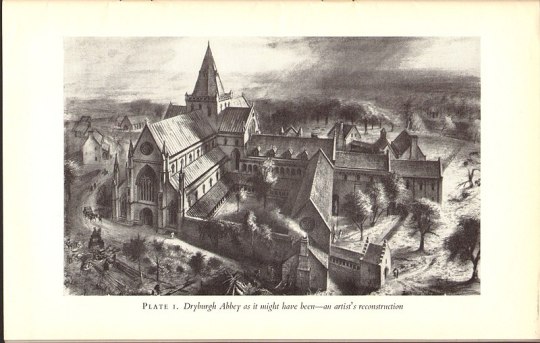
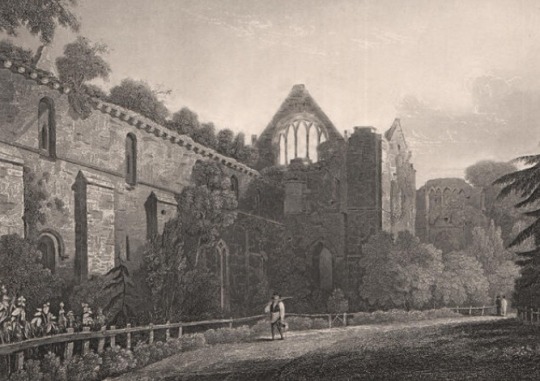
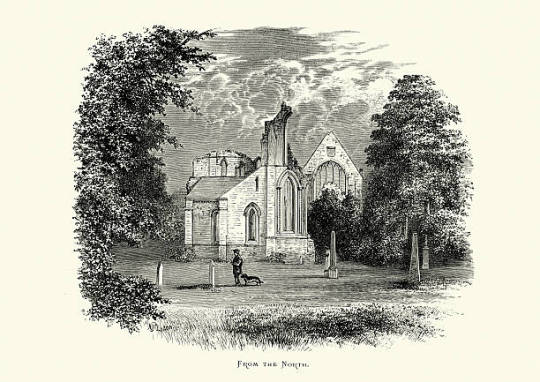
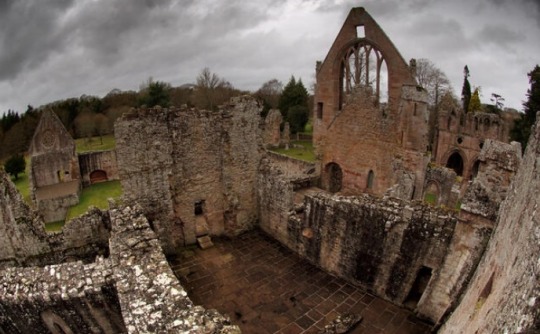
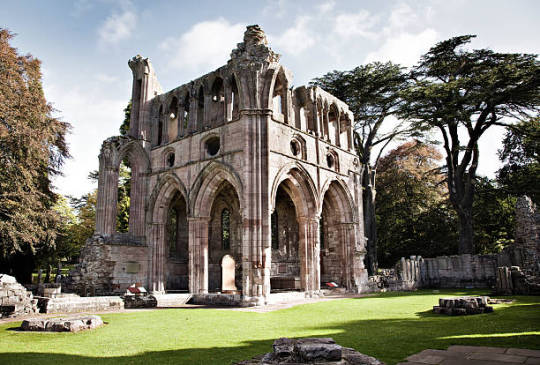

On 10th November, the year 1150 work began on the construction of Dryburgh Abbey in the Scottish Borders.
Standing on an elevated site formed by a loop of the River Tweed about five miles from Melrose, Dryburgh Abbey’s seclusion is part of its undoubted charms that have captivated many souls down the ages. There is little of the original Abbey church left, but the remains of the sacristy and cloisters have survived and the building is well looked after now as it is in the care of Historic Environment Scotland.
At the time of its foundation Scotland was ruled over by the man who many people consider to be Scotland’s greatest king, David I, son of Malcolm Canmore and St Margaret of Scotland. He both ordered and funded the construction of several abbeys and monasteries as part of his Davidian Revolution which transformed the face of Scotland, but Dryburgh was not one of them.
There had been some sort of clerical institution at Dryburgh as far back as the early seventh century as ancient writings show that St Modan, a follower of St Columba, was described as being the abbot of Dryburgh in 622. As with all Scottish history from the Dark Ages and early mediaeval period, almost all records as existed about buildings and personalities have long been lost, and there is no physical evidence of the older establishment whatsoever.
Though approved by King David, Dryburgh Abbey was the foundation of Hugh de Morville or Moreville, a Norman knight who came over from Cotentin to northern England after King Henry I gave that part of northern France to David. He was almost certainly one of the French knights who helped David retain most of southern Scotland on behalf of his brother King Alexander I, known as the Fierce.
David was both the Earl of Huntingdon and the Prince of the Cumbrians which took in the area formerly occupied by the Kings of Strathclyde. David gave de Morville lands in Huntingdon and Westmoreland, so it would make sense that Hugh de Morville came into Scotland and took possession of lands given to him by David. He was also made Constable of Scotland after his predecessor was killed in battle in 1138.
Being allowed to build his own abbey shows how much he was appreciated by David. De Morville took a personal interest in the construction and shrewdly did not make it either as large or as powerful as those abbeys founded by David such as Holyrood and Melrose. With its location by the Tweed and the obviously intricate stonework that still survives,
Dryburgh Abbey was outstandingly beautiful. It was built quite quickly after de Morville was able to attract Premonstratien canons regular – not monks confirmed to a monastery but an order of preachers and pastors.The White Canons, as they were known from their robes, arrived from Alnwick Abbey at Dryburgh in 1152, and were soon joined by a prominent local lord, none other than Hugh de Morville who became a canon and died in the Abbey in 1162. His son, also Hugh, inherited his father’s lands in northern England and became infamous as one of the four knights who assassinated St Thomas a Becket, Archbishop of Canterbury, in 1170.
Dryburgh Abbey seems to have thrived until the Wars of Independence when it was burned down by the English army on their humiliating retreat from their 1322 invasion of Scotland under Edward II, loser of Bannockburn. They burned Holyrood and Melrose, too, and an enraged Robert the Bruce was appalled at the actions of supposed Christians, so much so that he gathered an army and charged deep into England in what was known as the Great Raid of 1322, routing the English army at the Battle of Old Byland to further humiliate Edward II who barely escaped with his life.
In 1385, another English army burned Dryburgh again, destroying the western frontage of the Abbey church. This was rebuilt, however, but by the time of King James IV, there was no longer sufficient canons in the Abbey which was handed over to a commendator – an administrator of church buildings appointed by the monarch.
Dryburgh was sacked twice more by the English in 1544, and when the Reformation took place in 1560 there were just 10 canons left, and they were all gone within a few decades. The Abbey was allowed to become a ruin, and passed into the control of various people until it was acquired in 1786 by David Erskine, 11th Earl of Buchan, founder of the Society of Antiquaries of Scotland. He re-created the ruin, added monuments and generally made the Abbey beautiful again .
Buchan died in 1829 and was buried in the Abbey. At one time the ruin was owned by the Haliburton family and they retained the right of burial within its walls. That is why the graves and memorial stones of Sir Walter Scott and Field-Marshal Earl Haig, both descendants of the Haliburtons, are there along with various members of their family.
Historic Environment Scotland says this about Dryburgh Abbey: “While a greater part of the abbey church is now gone, what does remain – principally the two transepts and west front – is of great architectural interest. The cloister buildings, particularly the east range, are among the best preserved in Scotland. The chapter house is important as containing rare evidence for medieval painted decoration. The whole site, tree-clad and nestling in a loop of the River Tweed, is spectacularly beautiful and tranquil.”
Dryburgh Abbey has become a place of pilgrimage for lovers of Scott in particular, but deserves to be better known because of its history and sheer beauty.
34 notes
·
View notes
Text
"Some modern historians, apparently fascinated by the fact that Matilda was eleven years older than her second husband, Geoffrey of Anjou, have been quick to assert that the marriage was unhappy. The historical basis for this assertion rests upon the word of the Durham chronicler, who stated that when Matilda returned to Henry I’s court in 1129 it was because Geoffrey had repudiated her. [Historians have thus assumed that their mutual incompatibility led to hostility and an eventual separation]. However, it must be noted that the northern chronicler was hardly in a position to have first-hand information about events across the Channel, and that he had the chronology of the affair completely wrong. The author placed Matilda’s marriage in 1129, and wrote that only a few days after King Henry returned to England on 13 July of that year, he was told that his daughter had been repudiated by her husband and had returned to Rouen with only a few attendants. The marriage actually took place in 1128, and Matilda was in Anjou with her husband in 1129 when the la Haye brothers brought a charter in favor of the abbey of Fontevraud to her for her confirmation. The other contemporary accounts of Matilda’s separation from her husband did not record her departure or suggest reasons for it, but only noted her return to Anjou in 1131.
It is possible that Matilda’s return to her father’s court in 1129 was not a marital separation at all, but rather a political mission. Perhaps Matilda and Geoffrey grew uneasy in their isolation and began to doubt the commitment of the Anglo-Norman barons to their cause. Leaving her husband behind to manage affairs in Anjou, Matilda may have travelled to Normandy seeking clarification of her position. A few scraps of evidence point in this direction. A letter that Hildebert of Lavardin wrote to Henry I in 1131 expressed pleasure that the king was now reconciled with the count of Anjou, who ‘had now fallen in with his wishes in everything concerning him and his daughter’. Henry of Huntingdon and Robert of Torigny stated that a ‘great council’ held at Northampton on 8 September 1131 decided that Matilda should be returned to her husband. The wording implies a decision made by the great men of the realm for political reasons, not a family’s success in persuading a tearful daughter to return to a husband whom she disliked. Furthermore, William of Malmesbury wrote that ‘no small gathering of the nobility being held at Northampton, the oath of fidelity to her was renewed by those who had already sworn and also taken by those who had not done so previously’. The renewal of the oath also suggests that Matilda’s mission may have been occasioned by concern over the succession rather than by the marital discord that historians have often taken for granted."
-Jean A. Truax, "Winning over the Londoners: King Stephen, the Empress Matilda and the Politics of Personality", The Haskins Society Journal 8 (1996)
#empress matilda#geoffrey of anjou#my post#12th century#We don't and can't know the historical truth but this is an interesting alternate perspective for sure!#though it doesn't change the fact that Matilda does seem to have been coerced/forced/pushed into the marriage#and that fact in turn cannot be used to determine what they thought of each other or how they got along after they did marry#also both perspectives are not mutually exclusive - they could've become estranged AND she might have left to settle her succession#But ofc it's entirely possible that this alternate version may have been true#It does fit the claims of chronicles like Torigny who spoke of how there were tensions between Henry and Matilda & Geoffrey#before his death because he refused to surrender her dowry castles or pay homage to her as he should have#But ultimately however the marriage began they do seem to have formed more-or-less functional partnership#and were evidently mutually invested in their kids#so there's that#I really like alternate perspectives like this that make you question established historical narratives by scrutinizing the actual evidence#(also I had many many problems with this chapter and how it dismissed and downplayed gendered criticisms against Matilda#but that's another issue)
8 notes
·
View notes
Note
Hello! I was wondering how you came up with all the last names for the characters in your AUs! (besides the characters who have canon ones of course) I noticed Kumatora's is a reference to Osohe in the games but was there any specific inspiration for the others?
Ness Kimura: "Takuya" is one of Ness' alt name options in Mother 2. Whether this is an homage to Takuya Kimura the famous baseball player, or Takyua Kimura the famous actor, is uncertain as far as i know. Either way, the last name Kimura fits like a glove.
Poo Rana: No elaborate reference here. I made Poo Nepali in Intermission AU, and researched some common Nepali surnames to try n' find one that sounded nice for him. "Rana" is a name that simply means "king." It shares the same meaning in India, too - sorta fitting for Dalaam's hodge-podge of cultural inspirations.
Lucas & Claus Westwood: A down-to-earth soundin' name that's actually a big joke. Flint Westwood is a spin on Clint Eastwood.
Duster & Wess Huntington: In some stories and plays, Robin Hood's "true" name is "Robert Huntingdon," and he's associated with the title "Earl of Huntingdon." Noble thief, n' all that.
19 notes
·
View notes
Text
On This Day 17 Sep 1564, it is believed that Dorothy Devereux was born at Chartley Manor, Staffordshire.
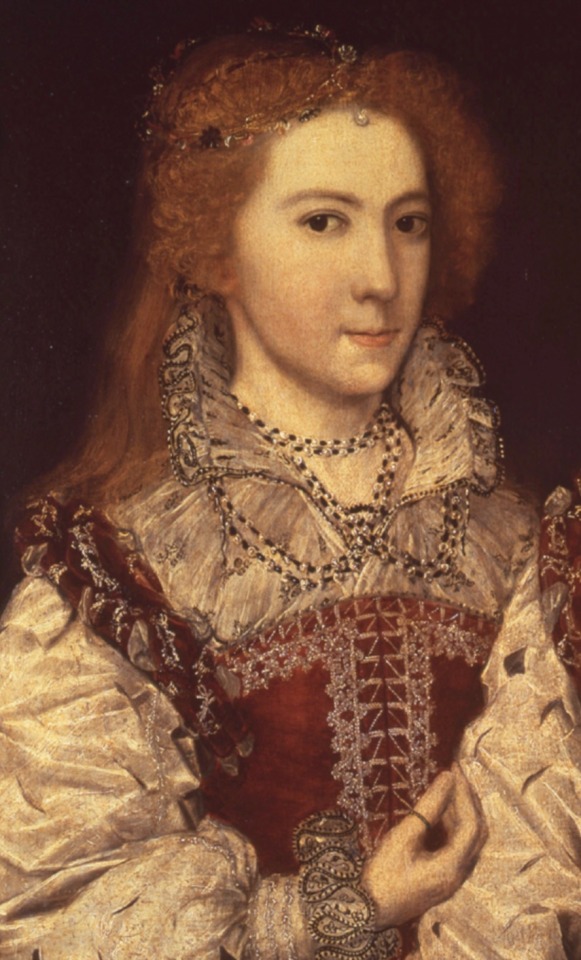
Dorothy was the younger daughter of Walter Devereux, Viscount Hereford and his wife Lettice Knollys, and was named after her paternal grandmother Dorothy Hastings.
Dorothy, along with her siblings, spent her childhood at Chartley - the principal seat of the Devereux family, being a late 15thc Manor House built nearby the abandoned and ruined Chartley Castle, 9 miles north-east of Stafford. The manor was surrounded by acres of woods and parkland, where the children would learn to ride and hunt.
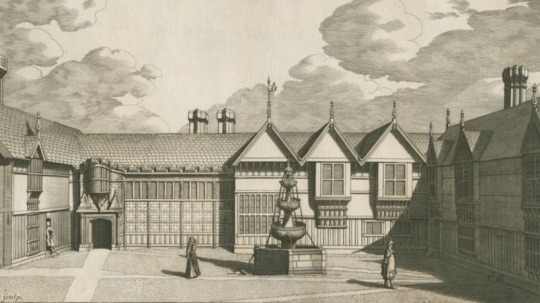
Dorothy was at Chartley when news of Walter's death in Sep 1576 reached the family. Dorothy then spent a year travelling with her mother Lettice and sister Penelope, including regular visits to Kenilworth Castle in which her mother, sister and other family members participated in Robert Dudley, Earl of Leicester's hunting parties.
In Feb 1578, as per Walter's will, Dorothy and Penelope were placed under the guardianship of the Earl and Countess of Huntingdon (Robert Dudley's sister Katherine), living primarily in York. It was here that they continued to receive a well-rounded humanist and 'strictly-Puritan' education.
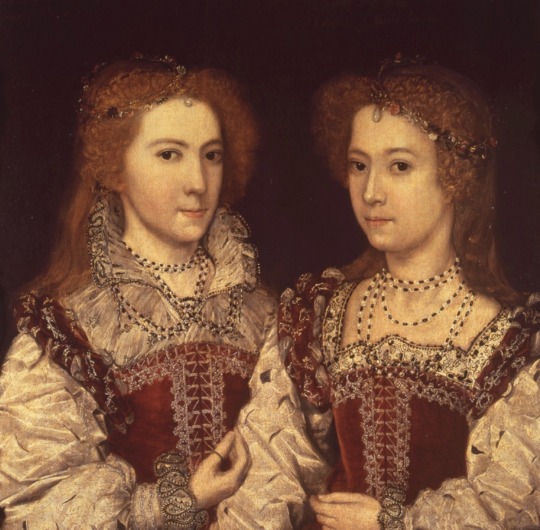
Penelope left for court in 1581, just after turning 18, leaving Dorothy in the care of the Huntingdons; it was around this time that the joint portrait of Dorothy and Penelope was painted, which was later hung at their stepfather's London home of Leicester House - “two ladyes in one picktwer, my La. Rich and my La. Doryt”.
#tudor england#the tudors#tudor#tudors#lettice knollys#tudor people#tudor women#the dudley women#tudor history#dorothy devereux#Penelope devereux#chartley#Robert dudley#history
2 notes
·
View notes
Text
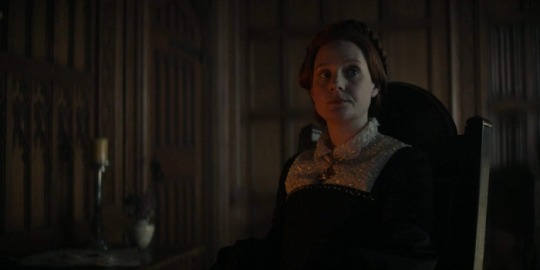
Mary I's Fight For The Throne
14th July - Mary sends out a scout
Great Yarmouth finally declare for Mary, who send a bailiff to "signify the towns faithfulness and allegiance, which the said queen took in very good part, giving him her great thanks and commendation, promising to requite this the towns dutiful kindness." 1
Around this time, Colchester also proclaim Mary queen, sending provisions to Framlingham that include "three tuns of beer [...] and the carriage of the same in six carts." 2
After she hears nothing from Glemham and Tyrrell sent to Lord Wentworth yesterday, Mary sends one of her most trusted men Henry Jerningham to follow after them and discover if they have succeeded.
While in an nearby inn, Jerningham learns in conversation that "a squadron of five ships of the late King Edward VI, laden with soldiers and weaponry, had been forced into the safety of Orwell haven by bad weather and was lying there [...] The crews were in a state of great disturbance and had most courageously mutinied against their officers because of the disowning of Princess Mary." 3 One of the sailors onboard disembarked and is now in the inn.
He orders the sailor brought to him to verify the tale. When he does, Jerningham decides to set out in the morning with Glemham and Tyrrell, who are sleeping in the same inn.
Meanwhile in London...
Forces are mustered on Tothill 4 and paid a month's wages in advance. 5
The Duke of Northumberland leaves London for Cambridge, with his sons Ambrose and Henry, Sir John Gates, Sir Thomas Palmer, the Marquis of Northampton, Francis Hastings earl of Huntingdon, the earls of Rutland and Westmorland, and various troops. 6
The Imperial ambassadors send a man after Northumberland's army to find out news. 7
Sources:
1. Chronicle of Queen Jane and Queen Mary
2. Chronicle of Queen Jane and Queen Mary
3. Vita Mariae Angliae Reginae of Robert Wingfield
4. The Chronicle of the Grey Friars: Jane
5. Spanish State Papers, 12th July 1553
6. Vita Mariae Angliae Reginae of Robert Wingfield
7. Spanish State Papers, 16th July 1553
6 notes
·
View notes
Text
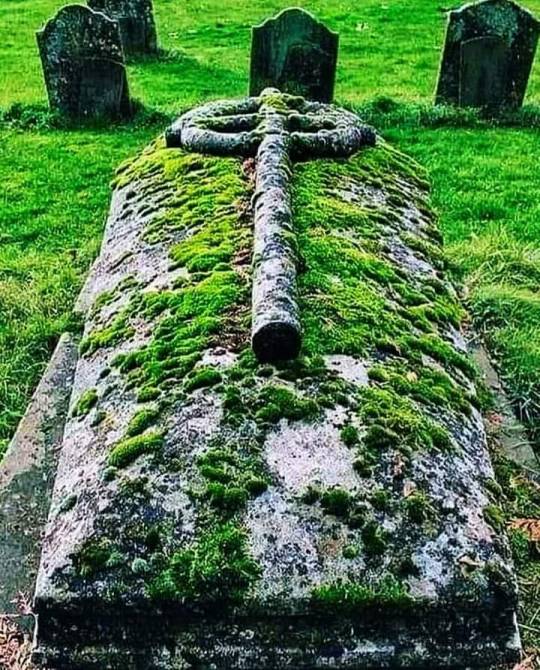
Grave of Robin Hood
Died: November / 8 / 1247.
"Here under this little stone
Lies Robert Earl of Huntingdon
Never has an archer been so good
And people called him Robin Hood
Outlaws like him and his men
England will never see it again.
Western Yorkshire England.
15 notes
·
View notes
Text
I was prepared to despise Robert of Huntingdon with all my being, but I've finished the first episode of season three and he's growing on me. This is bringing up long-untouched memories of my teenage Doctor Who phase.
3 notes
·
View notes
Text
Fathers and Sons
Match 1
Robin Hood [Sean Connery], Robin & Marian (1976)
VS.
Robert of Huntingdon [Jason Connery], Robin of Sherwood (1984-1986)
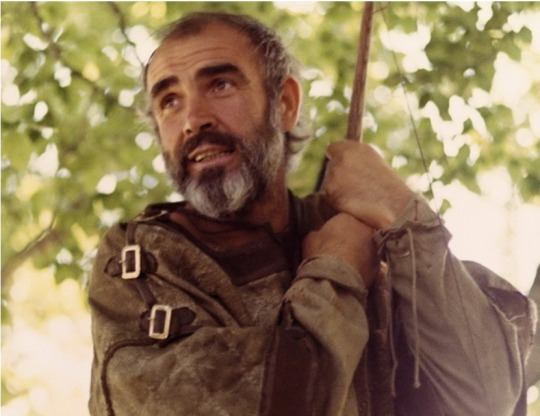
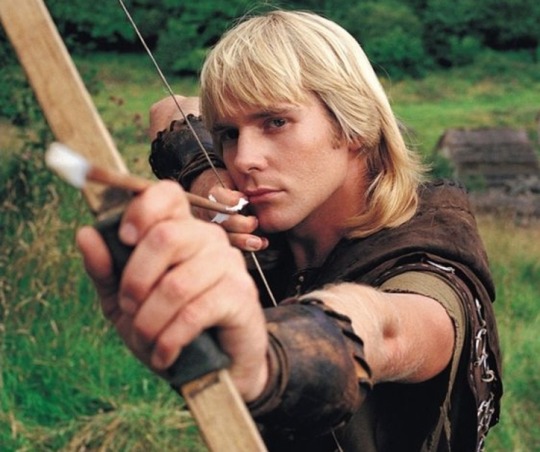
#Fathers Vs. Sons#fuck that medieval man#robin hood#robert of huntingdon#robin and marian#robin of sherwood#sean connery#jason connery
19 notes
·
View notes
Text

Some more fics of mine - standalones (well, a few are part of a series but are currently the only entry so I'm putting them here):
of legacies and lies - Jack Thompson's granddaughter Alex, a SHIELD agent, deals with the aftermath of the HYDRA reveal while trying to get back home. Meanwhile her grandparents try and make sure she isn't made into a scapegoat by the authorities.
a god's reflection - a rewritten Loki oneshot set between Thor 1 and Thor 2 as he reflects on his actions on Midgard.
when one door closes (another opens) - Brianna Thawne, the Cobalt Blue of Earth-4 and its 22nd Century, joins her world's Legends after she stops Kate Allen from changing time, an action which caused a rift in Team Flash and left Brianna ostracised.
now we have (the freedom to choose) - Legends of Tomorrow AU, where Carter realises that now he's finally free of the cycle, maybe he doesn't have to be with Kendra.
you've always been (a part of me) - Krypton Post-Canon AU, set decades after the show, where Seg is hit with the reminder of his husband's mortality and doesn't deal with it well
speak (and i'll listen) - MonWinn oneshot, set post the Music Meister, in which Winn stresses out and Mon-El comforts him
to new beginnings - Westhallen New Year's Resolution fic for Polyam Shipping Day in January 2022
doubt (and the bonds of love) - when Mon-El becomes distant, Winn can't figure out why until Kara points out that he's not the only insecure one in the relationship
the future (is ours) - a Flash AU where Iris is the Flash and Barry and Eddie are the ones dating. Eobard has been defeated and everyone's made it out the other side...but Eddie fears for his relationship after finding out Barry and Iris were meant to be together...
right here (is where i'm meant to be) - fluffy, lazy morning Segdam oneshot
to live and rise (and hope again) - focuses on Eliana Kent, the daughter of Clark Kent and Lana Lang from another universe, who was forced to flee her own world with thousands of others after draconian anti-alien measures were enforced. Settling on Earth-38 with her adoptive aunts, Eliana doesn't expect anything drastic to happen...until the rest of her powers start setting in...
Ambiguity - FFN import, written for Stupid Mario Bros and a Mr L centric fic as he fights to fight his host body's brother
the truth (long overdue) - Spider-Man 2 AU where Peter goes back to explain everything to Harry and unknowingly averts tragedy later down the line
one night changes nothing (except when it changes everything) - Krypton fic where Seg and Adam sleep together one night early in S1 but Adam figures nothing's gonna change, because it's not like Seg of all people would return his feelings (hint: he's wrong)
remaining steadfast (accepting your purpose) - Robin of Sherwood S3 AU where Robert of Huntingdon stays the first time around, nervous as he is about stepping into the shoes of a hero
true friendship (becomes stronger over time) - Link & Saria post OOT (child timeline), where an older Link goes to talk to his best friend after feeling out of place recently
we have time (to start over) - X-Men 3 AU where Jean lived and brought Scott back, and now he's trying to figure out why Logan is acting so strange around him (it's the guilt)
i love you (let me show it) - Segdam fic where Seg proposes to Adam out of the blue
i will stand by you (i will help you through) - Angel & Riley friendship fic, in which Angel doesn't act like a dick in 4x20, instead recognising Riley as a young man in pain, and this has a massive effect on things
discussions and coffee (at three am) - Legends AU where Henry Heywood lived and is now a Legend alongside his grandson
2 notes
·
View notes
Text
Oh! Ima answer these for Robin Hood since he's my most developed character!
1. He has a older sister but they aren't too close he's closer to her son and his nephew (Will Scarlet)
2. Really close he takes care of her since he's all she has besides his sister who is preoccupied with her family
3. Horrible since he's illegitimate and his dad's david earl of huntingdon (you know the basically Scottish royalty guy who is the ancestor to robert the bruce) and his dad doesn't really acknowledge his existence
4. I'm still working on a beginning so this one's still in workshop mode but something will change him and get him to become the robin hood of legend when I come up with it lol
5. Well he doesn't have pockets but you'll find knives any kinda food he has been able to find and any medical herbs and other necessities he needs in his bag
6. Probably not lol I don't really focus on dreams in any of my stories
7. Same answer
8. Bahhaa these are not made for the year 1190
9. He went from poor yeoman who was basically shunned cause he was illegitimate to living in the woods so
10. Idk
11. Book is still in early stages so not planed out yet but will probably be something to do with some of his loved ones almost dying or could have something to do with torture who knows it's 1190 england
12. Same but with being with his loved ones ones not them almost dying
13. Bahahhaha absolutely not he's immune to it he's seen so much blood in his life
14. Faces
15. He does struggle with wanting to keep the money he steals for himself but always gives it to the ones who need it most (even if it drives a wedge between him and his friends)
16. Happiness
17. Idk a stick he was poor probably played knights and outlaws with his bestie
18. As a ambitious person he values both but mostly intelligence
19. He isn't easily trusting but when he does trust someone he can trust them too much and it makes it hard for him to give his trust to others and makes it so much harder when those he trust betray him
20. Both really the only person he ever worries to compare himself to is his father who does not want to become
21. Caused he is quick to blame himself for everything
22. Selflessness
23. If they're stuck up and think they're better than someone else
24. Not at all its very hard for him to trust anyone
25. Fairly quickly not like jumping the gun or anything just if they acting sus they acting sus but if it's someone he trust he will be blind to it till its to late
26. He's great with kids he doesn't know how or why but kids love him
27. Not well
28. He will be quick to get in a fight
29. He wanted his father to accept him so they could be a family no that didn't happen he just grew more bitter towards his father
30. The priest stuffing their pockets with the peoples money and doing whatever terrible thing they want to and blaming God for their actions
31. Sitting out in the woods with enough clearing for the sun to shine on him while he has Marian and his wolf pup with him
32. Idk I can think of a lot of things that would make most people uncomfortable lol
33. All three in stages
34. He'd keep trying a few times but would then move on to the next plan
35. His arrogance gets turned up times ten
36. Very hostile he will let you know quickly he does not like you
37. Neither matter to him
38. Remove the problem/threat (unless it's a person he won't kill a person)
39. Uh well if he has it didn't affect him
40. He's poor and it's 1190 everyone he knows are the servers
41. If we're talking his main goal from the series that just to help people who are suffering so
42. Not that I've given him yet who knows if I will change my mind on this one tho
43. I'm assuming this means someone that they both depended on each other and that would be his childhood best friend Gilbert Whitehand
44. Fairly average he won't say it unless he means it but once he knows he means it he will say it
45. He's a Christian so he knows he will go to heaven and so no he has no fear of dying
Character Development Questions: Hard Mode
Does your character have siblings or family members in their age group? Which one are they closest with?
What is/was your character’s relationship with their mother like?
What is/was your character’s relationship with their father like?
Has your character ever witnessed something that fundamentally changed them? If so, does anyone else know?
On an average day, what can be found in your character’s pockets?
Does your character have recurring themes in their dreams?
Does your character have recurring themes in their nightmares?
Has your character ever fired a gun? If so, what was their first target?
Is your character’s current socioeconomic status different than it was when they were growing up?
Does your character feel more comfortable with more clothing, or with less clothing?
In what situation was your character the most afraid they’ve ever been?
In what situation was your character the most calm they’ve ever been?
Is your character bothered by the sight of blood? If so, in what way?
Does your character remember names or faces easier?
Is your character preoccupied with money or material possession? Why or why not?
Which does your character idealize most: happiness or success?
What was your character’s favorite toy as a child?
Is your character more likely to admire wisdom, or ambition in others?
What is your character’s biggest relationship flaw? Has this flaw destroyed relationships for them before?
In what ways does your character compare themselves to others? Do they do this for the sake of self-validation, or self-criticism?
If something tragic or negative happens to your character, do they believe they may have caused or deserved it, or are they quick to blame others?
What does your character like in other people?
What does your character dislike in other people?
How quick is your character to trust someone else?
How quick is your character to suspect someone else? Does this change if they are close with that person?
How does your character behave around children?
How does your character normally deal with confrontation?
How quick or slow is your character to resort to physical violence in a confrontation?
What did your character dream of being or doing as a child? Did that dream come true?
What does your character find repulsive or disgusting?
Describe a scenario in which your character feels most comfortable.
Describe a scenario in which your character feels most uncomfortable.
In the face of criticism, is your character defensive, self-deprecating, or willing to improve?
Is your character more likely to keep trying a solution/method that didn’t work the first time, or immediately move on to a different solution/method?
How does your character behave around people they like?
How does your character behave around people they dislike?
Is your character more concerned with defending their honor, or protecting their status?
Is your character more likely to remove a problem/threat, or remove themselves from a problem/threat?
Has your character ever been bitten by an animal? How were they affected (or unaffected)?
How does your character treat people in service jobs?
Does your character feel that they deserve to have what they want, whether it be material or abstract, or do they feel they must earn it first?
Has your character ever had a parental figure who was not related to them?
Has your character ever had a dependent figure who was not related to them?
How easy or difficult is it for your character to say “I love you?” Can they say it without meaning it?
What does your character believe will happen to them after they die? Does this belief scare them?
133K notes
·
View notes
Text


January 28th 1290 saw the death of Devorgilla, Lady of Galloway.
One with differing dates, but the majority of sources give January 28th, the name Dervorguilla or Dervorgilla was a Latinisation of the Gaelic Dearbhfhorghaill (alternative spellings, Derborgaill or Dearbhorghil).
Through her mother, Devorgilla was descended from King David I of Scotland. Her grandmother Maud was a member of the family of the powerful Earl of Chester while her aunt Isobel of Huntingdon was grandmother to Robert the Bruce.
The Lanercost states that Dervorguilla was the “widow of Lord John de Balliol” and that she “was a woman largely endowed with money and lands, both in England and in Scotland.” It also adds in her favour that “she had a much richer endowment in the nobility of her heart, being daughter and heiress of the magnificent Alan, the sometime Lord of Galloway.” Regarding her death, it states that “She passed from the world, full of years, at Castle Barnard, and was buried at Duquer, in Galloway, a Monastery of Cistercians, which she herself built and endowed.” Looks like ‘endowed’ was a well used term in those days; at least in the Lanercost.
Arguably the most famous fact about her, in Scotland at least, is that she was the mother of our erstwhile King John, it was through her that his legitimate claim to the Scottish crown came about, she was a great-great-granddaughter of King David I. Had she lived a wee whiles her lineage would have thrown up the possibility of her being named Queen of Scotland after the death of Margaret Maid of Norway in September 1290, this would have precluded that nasty Edward I interfering with our affairs, Queen Dervorguilla, how does that sound? This alternative timeline may have been the start of a Balliol dynasty, no Bruce’s or Stewarts such is the ifs and buts of history.
While a lot of marriages were arranged to form alliances and were loveless, that is not the case with that is certainly not the case with Lady Dervorguilla and John Balliol snr, on the death of her husband, in 1268, Dervorguilla had his heart embalmed and kept in a casket of ivory bound with silver. The casket travelled with her for the rest of her life.
Poetry has been written of the love shared between John Balliol and Dervorguilla of Galloway, the Lady also founded New Abbey in Dumfries & Galloway in honour of her husband, after her own death the Monks in the Abbey started calling it Dulce Cor, Latin for Sweet Heart, and so it became known as Sweetheart Abbey.
She was also the co-founder, with her husband of Balliol College, Oxford in 1263, even after John Balliol’s death Lady Dervorguilla continued to support it, securing its permanent endowment in 1282, as well as formal statutes, a seal, and a house to study in. It’s a shame that College did not allow women students until 1979!.
If you have ever visited Dumfries you will have no maybe crossed over the river Nth on Dervorguilla Bridge, built in 1426 and named in her honour.
She was buried in front of the high altar at Sweetheart Abbey. A stone slab in the floor marks the supposed site of her burial, the actually place being lost due to the mindless destruction of he Scottish Reformation, their lost graves lie amongst the ruins, which is described as a “shrine to human and divine love”.
An effigy found by archaeologists can be seen at the Abbey, sadly the head is missing, but it is thought to be the Lady and in 2017 it was named number 10 by VisitScotland in their 25 Objects That Shaped Scotland’s History. It can be seen in the second photo.
17 notes
·
View notes
Text


HAPPY BIRTHDAY to the 45 RPM single (1954), Tomaso Albinoni, Emanuel Ax, Mick Box (Uriah Heep), Sônia Braga, Barbara Bush, James Darren, Robert Fripp’s 1979 EXPOSURE album, Gabrielle Giffords, Greg Ginn (Black Flag), Don Grady, Fuzzy Haskins (Funkadelic), Annie Haslam, Mick Hucknall, Jan & Dean’s 1960 single “Little Old Lady From Pasadena,” Jakko Jakszyk, George Kirby, Paul McCartney & Wings (under-rated) 1979 BACK TO THE EGG album, Chuck Negron, George Orwell’s 1949 novel “1984,” Rob Pilatus, Robert Preston, Nick Rhodes, Tony Rice, Rolling Stones 1968 single “Jumpin’ Jack Flash,” Boz Scaggs, Robert Schumann, Shilpa Shetty, Sturgill Simpson, Nancy Sinatra, Jerry Stiller, Derek Trucks, Bonnie Tyler, Frank Lloyd Wright, and a phenomenal award-winning artist, film-maker, painter, photographer and musician, Nathan Wagoner.
We go back to high school, when he had an enviable mane of hippie hair that could be seen by satellite, and he demonstrated that you didn’t have to be a star quarterback to be a chick magnet. His family warmly welcomed me into their home, feeding me with exotic meals and searing intelligence that made me feel safe and smart all at once. Yet, Nathan was no molly-coddling codependent soft-soaper—he would tongue-lash me and kick my a** when I needed it—what real friends do. We always had bands and music schemes going, none of which topped the charts, but they set the stage for work ethics. Nathan says, “Good painting does no work,” but in his images I see a continuum of brainstorms swooping in with timeless appointments and other unintended intersects, like cover art for LPs, novels, and films that haven’t been made yet—actually I’ve used his art in my music videos. Meanwhile, his stark photographs of “noir Pennsylvania” play with shadows and light in ways that are both startling and funny. See for yourself on his gallery site: https://nathanwagoner.com ...also check out his documentaries and short films https://www.youtube.com/@nwagoner ...and HB NW—thank you for raising the bar of creativity in sound and vision.
#nathanwagoner #artist #filmmaker #musician #painter #photographer #minnesota #minneapolis #Huntingdon #pennsylvania #gallery #birthday
1 note
·
View note
Text
UK politics. Not available MP for next parliament, they're not standing for election. Source ITV 24 May 2024.
How I found out my own MP is going to not campaign. Some voices who speak up with relative sense will not be there in the next parliament.
Conservative
– Adam Afriyie, Windsor (MP since 2005; majority 20,079)
– Nickie Aiken, Cities of London & Westminster (MP since 2019; majority 3,953)
– Lucy Allan, Telford (MP since 2015; majority 10,941)
– Stuart Andrew, Pudsey (MP since 2010; majority 3,517)
– Richard Bacon, South Norfolk (MP since 2001; majority 21,275)
– John Baron, Basildon & Billericay (MP since 2001; majority 20,412)
– Sir Paul Beresford, Mole Valley (MP since 1997; majority 12,041)
– Sir Graham Brady, Altrincham & Sale West (MP since 1997; majority 6,139)
– Steve Brine, Winchester (MP since 2010; majority 985)
– Lisa Cameron, East Kilbride, Strathaven & Lesmahagow (elected as SNP MP in 2015; majority 13,322; defected to Conservatives in 2023)
– Andy Carter, Warrington South (MP since 2019; majority 2,010)
– Sir Bill Cash, Stone (previously MP for Stafford 1984-97, then Stone since 1997; majority 19,945)
– Jo Churchill, Bury St Edmunds (MP since 2015; majority 24,988)
– Greg Clark, Tunbridge Wells (MP since 2005; majority 14,645)
– Chris Clarkson, Heywood & Middleton (MP since 2019; majority 663)
Dame Tracey Crouch, Chatham & Aylesford (MP since 2010; majority 18,540)
– Dehenna Davison, Bishop Auckland (MP since 2019; majority 7,962)
– Jonathan Djanogly, Huntingdon (MP since 2001; majority 19,383)
– Sir James Duddridge, Rochford & Southend East (MP since 2005; majority 12,286)
– Philip Dunne, Ludlow (MP since 2005; majority 23,648)
– Sir Michael Ellis, Northampton North (MP since 2010; majority 5,507)
– George Eustice, Camborne & Redruth (MP since 2010; majority 8,700)
– Sir David Evennett, Bexleyheath & Crayford (MP since 2005; majority 13,103)
Mike Freer, Finchley & Golders Green (MP since 2010; majority 6,562)
– Nick Gibb, Bognor Regis & Littlehampton (MP since 1997; majority 22,503)
– Jo Gideon, Stoke-on-Trent Central (MP since 2019; majority 670)
– Michael Gove, Surrey Health (MP since 2005; majority 18,349)
– Sir Robert Goodwill, Scarborough & Whitby (MP since 2005; majority 10,270)
– Chris Grayling, Epsom & Ewell (MP since 2001; majority 17,873)
– James Grundy, Leigh (MP since 2019; majority 1,965)
– Robert Halfon, Harlow (MP since 2010; majority 14,063)
– Stephen Hammond, Wimbledon (MP since 2005; majority 628)
majority 1,805)
– Sir Sajid Javid, Bromsgrove (MP since 2010; majority 23,106)
– David Jones, Clwyd West (MP since 2005; majority 6,747)
– Sir Greg Knight, East Yorkshire (previously MP for Derby North 1983-97, then East Yorkshire since 2001; majority 22,787)
– Kwasi Kwarteng, Spelthorne (MP since 2010; majority 18,393)
– Dame Eleanor Laing, Epping Forest (MP since 1997; majority 22,173)
– Pauline Latham, Mid Derbyshire (MP since 2010; majority 15,385)
– Sir Brandon Lewis, Great Yarmouth (MP since 2010; majority 17,663)
– Tim Loughton, East Worthing & Shoreham (MP since 1997; majority 7,474)
– Craig Mackinlay, South Thanet (MP since 2015; majority 10,587)
– Theresa May, Maidenhead (MP since 1997; majority 18,846)
Stephen McPartland, Stevenage (MP since 2010; majority 8,562)
– Huw Merriman, Bexhill & Battle (MP since 2015; majority 26,059)
– Kieran Mullan, Crewe & Nantwich (MP since 2019; majority 8,508)
– Sir Bob Neill, Bromley & Chislehurst (MP since 2006; majority 10,891)
– Matthew Offord, Hendon (MP since 2010; majority 4,230)
– Mark Pawsey, Rugby (MP since 2010; majority 13,447)
– Sir Mike Penning, Hemel Hempstead (MP since 2005; majority 14,563)
– Andrew Percy, Brigg & Goole (MP since 2010; majority 21,941)
– Will Quince, Colchester (MP since 2015; majority 9,423)
– Dominic Raab, Esher & Walton (MP since 2010; majority 2,743)
– Sir John Redwood, Wokingham (MP since 1987; majority 7,383)
– Nicola Richards, West Bromwich East (MP since 2019; majority 1,593)
– Douglas Ross, Moray (MP since 2017; majority 513)
– Paul Scully, Sutton & Cheam (MP since 2015; majority 8,351)
– Sir Alok Sharma, Reading West (MP since 2010; majority 4,117)
– Chloe Smith, Norwich North (MP since 2009; majority 4,738)
– Henry Smith, Crawley (MP since 2010; majority 8,360)
– Royston Smith, Southampton Itchen (MP since 2015; majority 4,498)
– Bob Stewart, Beckenham (MP since 2010; majority 14,258)
- Sir Gary Streeter, Devon South West (previously MP for Plymouth Sutton 1992-97, then Devon South West since 1997; majority 21,430)
– Edward Timpson, Eddisbury (previously MP for Crewe & Nantwich 2008-2017, then Eddisbury since 2019; majority 18,443)
– Sir Charles Walker, Broxbourne (MP since 2005; majority 19,807)
– Robin Walker, Worcester (MP since 2010; majority 6,758)
– Ben Wallace, Wyre & Preston North (previously MP for Lancaster & Wyre 2005-10, then Wyre & Preston North since 2010; majority 16,781)
– Jamie Wallis, Bridgend (MP since 2019; majority 1,157)
– Craig Whittaker, Calder Valley (MP since 2010; majority 5,774)
– Nadhim Zahawi, Stratford-on-Avon (MP since 2010; majority 19,972)
Labour
– Dame Margaret Beckett, Derby South (previously MP for Lincoln 1974-79, then Derby South since 1983; majority 6,019)
– Paul Blomfield, Sheffield Central (MP since 2010; majority 27,273)
– Sir Ben Bradshaw, Exeter (MP since 1997; majority 10,403)
- Karen Buck, Westminster North (previously MP for Regent’s Park & Kensington North 1997-2010, then Westminster North since 2010; majority 10,759)
– Jon Cruddas, Dagenham & Rainham (previously MP for Dagenham 2001-10, then Dagenham & Rainham since 2010; majority 293)
– Alex Cunningham, Stockton North (MP since 2010; majority 1,027)
– Wayne David, Caerphilly (MP since 2001; majority 6,833)
– Natalie Elphicke, Dover (elected as Conservative MP in 2019; majority 12,278; defected to Labour in 2024)
- Colleen Fletcher, Coventry North East (MP since 2015; majority 7,692)
- Yvonne Fovargue, Makerfield (MP since 2010; majority 4,740)
– Margaret Greenwood, Wirral West (MP since 2015; majority 3,003)
– Harriet Harman, Camberwell & Peckham (previously MP for Peckham 1982-97, then Camberwell & Peckham since 1997; majority 33,780)
– Dame Margaret Hodge, Barking (MP since 1994; majority 15,427)
- Sir George Howarth, Knowsley (previously MP for Knowsley North 1986-97, then Knowsley North & Sefton East 1997-2010, then Knowsley since 2010; majority 39,942)
– Kevan Jones, North Durham (MP since 2001; majority 4,742)
– Holly Lynch, Halifax (MP since 2015; majority 2,569)
– Ian Mearns, Gateshead (MP since 2010; majority 7,200)
– Dan Poulter, Central Suffolk & North Ipswich (elected as Conservative MP in 2010; majority 23,391; defected to Labour in 2024)
– Christina Rees, Neath (MP since 2015; majority 5,637)
- Barry Sheerman, Huddersfield (previously MP for Huddersfield East 1979-83, then Huddersfield since 1983; majority 9,437)
– Alan Whitehead, Southampton Test (MP since 1997; majority 6,213)
– Dame Rosie Winterton, Doncaster Central (MP since 1997; majority 2,278)
SNP
– Mhairi Black, Paisley & Renfrewshire South (MP since 2015; majority 10,679)
– Ian Blackford, Ross, Skye & Lochaber (MP since 2015; majority 9,443)
– Douglas Chapman, Dunfermline & West Fife (MP since 2015; majority 10,699)
– Angela Crawley, Lanark & Hamilton East (MP since 2015; majority 5,187)
– Patrick Grady, Glasgow North (MP since 2015; majority 5,601)
– Peter Grant, Glenrothes (MP since 2015; majority 11,757)
– Stewart Hosie, Dundee East (MP since 2005; majority 13,375)
– John McNally, Falkirk (MP since 2015; majority 14,948)
– Philippa Whitford, Central Ayrshire (MP since 2015; majority 5,304)
Sinn Fein
– Mickey Brady, Newry & Armagh (MP since 2015; majority 9,287)
– Michelle Gildernew, Fermanagh & South Tyrone (MP for seat from 2001-2015 and since 2017; majority 57)
– Francie Molloy, Mid Ulster (MP since 2013; majority 9,537)
Green
– Caroline Lucas, Brighton Pavilion (MP since 2010; majority 19,940)
Plaid Cymru - one
– Hywel Williams, Arfon (previously MP for Caernarfon 2001-10, then Arfon since 2010; majority 2,781)
Independent - seven
– Crispin Blunt, Reigate (MP since 1997; formerly Conservative; majority 18,310)
– Nick Brown, Newcastle upon Tyne East (MP since 1983; formerly Labour; majority 15,463)
– Sir Jeffrey Donaldson, Lagan Valley (MP since 1997; formerly DUP; 2019 majority 6,499)
- Julian Knight, Solihull (MP since 2015; formerly Conservative; majority 21,273)
– Conor McGinn, St Helens North (MP since 2015; formerly Labour; majority 12,209)
– Mark Menzies, Fylde (MP since 2010; formerly Conservative; majority 16,611)
– William Wragg, Hazel Grove (MP since 2015; formerly Conservative; majority 4,423
1 note
·
View note
Text
Robert Hode, Fourth Earl of Huntingdon, with the powers of the King which are vested in me it is decreed that you forfeit to the throne your lands and title and all things in your possession....
HHHNNNGHHHH
Why did no one tell me that the Patrick Bergman Robin Hood film is good (I think, I've just started it. I like it so far).
If we have to do the Earl of Huntingdon thing (which. So many films do) then at least we are not doing the ex-crusader thing.
#this is a good hhhnghh by the way im eating this scene up#caput lupinum#robin on screen#robin hood 1991 (not that one)
33 notes
·
View notes